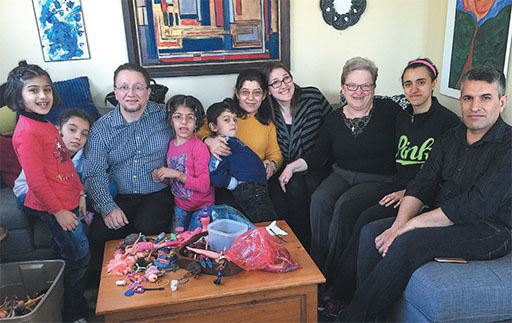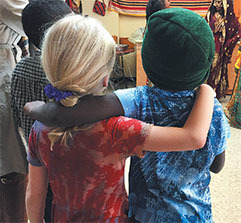Thousands of Canadian churches responded to the plight of Syrian refugees by becoming private sponsors for the first time. Here are three stories.
Listen to our podcast
Thousands of Canadian churches responded to the plight of Syrian refugees by becoming private sponsors for the first time. Here are three stories.
"The popular retelling of the Christmas story [in 2015] was ‘Jesus was a refugee,’" says Bryce Ashlin-Mayo, senior pastor of Westlife Alliance Church in Calgary, one of many churches that sponsored refugees as a result of the Syrian crisis. We love refugees, say many Christians, because a Refugee first loved us.
Sponsorship groups arose in the thousands in the face of the Syrian refugee crisis. Sponsor groups pledged to formally support refugees for a year. They raised tens of thousands of dollars, furnished apartments, found English classes and then welcomed their assigned refugees to their new life in Canada.
And as churches are discovering, that’s just the beginning of the joys and the struggles of sponsoring refugees.
 The Ali children enjoying some play time outside
The Ali children enjoying some play time outside
 The Alis received a warm welcome from Timberlea Baptist Church, Halifax. PHOTOS: MICHEL LECHMANN
The Alis received a warm welcome from Timberlea Baptist Church, Halifax. PHOTOS: MICHEL LECHMANN
Ready to embrace
Timberlea Baptist Church, Halifax
HOUSE KEYS are the only remains of Basheer Ali’s home in Kobani, Syria. He fled the city in September 2014 with two of his four children. He had no idea those keys would hang as a decoration on the living room wall of a Halifax apartment, dangling between a world map and a vertically hanging Canadian flag.
When he, his wife and their children – three girls and a boy ranging in age from five to 13 – arrived in Montreal this past February, they thought their final destination was Saint John, N.B. Rerouted to Halifax, the greater shock was finding people at the airport to welcome them, ready to bring them to a furnished apartment.
They thought they were "basically going to be led to a hotel room, and it was just going to be lonely," admits Nareen Haj Ali, Basheer’s wife. Holding back joyful tears at the airport was difficult.
Their already arduous journey included the added strain of illness. Basheer, Nareen, and two of their daughters Viyan and Zeen, moved to Gaziantep, Turkey in May 2014. The girls needed dialysis, treatment made inaccessible by the conflict. (An uncle in Syria cared for daughter Noujen and son Dlir.) The girls didn’t improve. Basheer returned for his other children. In September Kobani was raided, his home destroyed. In Turkey Basheer considered paying smugglers and risking the sea passage to Europe.
Canada’s offer – a paid, safe flight – "was destiny," says Nareen.
Not just for them, but also for Timberlea Baptist Church, a small Halifax congregation.
Timberlea had welcomed their first Syrian family on January 1, the first refugees they’d ever sponsored. The experience had been overwhelmingly positive. Under the blended visa referred program, both the government and church would pay for six months of the family’s expenses. The congregation, with fewer than 70 official members, raised the equivalent of a third of its annual budget in four months.
Then they received another call. Paul Carline, who oversees refugee sponsorships for the Convention of Atlantic Baptist Churches, called Michel Lechmann, Timberlea’s senior pastor. (The convention was the sponsorship agreement holder for Timberlea’s sponsorship.)
Carline explained the urgent needs of the family of six who needed to be redirected to Halifax. Two daughters required dialysis they could only receive at the IWK Health Centre in Halifax. Carline wondered if Lechmann knew any sponsorship groups ready to welcome a family. They were to arrive in two weeks.
Lechmann knew what he needed to do. "I have a very forgiving congregation," he laughs. He called the church’s sponsorship committee.
Ben John, a committee member, responded simply, "We cannot refuse them, so let’s say yes and God will provide." Within days the church had secured and furnished an apartment.
Sponsorship, says Ben John, reminds him of the Good Samaritan. "He took his own resources and paid for everything, and ensured this man was taken care of. I think that’s how we felt about this."
But that story doesn’t record the injured man’s response. The Alis are noticeably grateful, despite their difficulties. The girls’ dialysis three days a week limits the time the parents can learn English. Both girls are waiting for kidney transplants. But when strangers smile at Nareen, it "makes [her] day." They’re eager to give back to their community.
 Abdu, Ali, Hussen, Halima and Hawa
Abdu, Ali, Hussen, Halima and Hawa
 The youngest, Halima, has made fast friends in the St. Andrew’s congregation. PHOTOS: LESLEY HALLETT
The youngest, Halima, has made fast friends in the St. Andrew’s congregation. PHOTOS: LESLEY HALLETT
Nomads to Owen Sound
St. Andrew’s Presbyterian Church, Owen Sound, Ont.
OWEN SOUND, Ont., on the shores of Georgian Bay, seems an unlikely home for a nomadic family from deserts along the Red Sea.
Perhaps no one knows this better than St. Andrew’s Presbyterian Church, the family’s sponsors.
"It’s like drawing from a deck of cards," says Dick Hibma from the church’s sponsorship committee. "You work with the results of the cards that turn up."
In their case a single mother and four children from Eritrea. The church wanted to sponsor non-Syrian refugees, particularly those without close connections in Canada. The Syrian refugee crisis shed light on millions of refugees "that nobody in the world really knew about," explains Dana Benson, pastor at St. Andrew’s.
That includes this family, members of the Afar people. The Afar live along the border of the Red Sea in Eritrea, Ethiopia and Djibouti. The majority are illiterate, many nomadic. The homes they have are huts, domed so sandstorms pass over them – completely unlike modern apartments and Canadian winters.
"They come from a totally different place," Hibma says.
Helping the family settle has been extremely challenging, says Benson. It’s estimated a thousand Afar speakers live in Canada. None of them are in Owen Sound. Electronic translation isn’t available.
The mother is illiterate, compounding the challenges of learning English. She is likely overwhelmed, says Benson, "uprooted" from her tribal community and "stuck in Owen Sound," she says. "It’s just unimaginable."
The children provide some translation. When they’re not around, the church relies on Afar speakers, often in Ottawa or Toronto, to translate by speakerphone.
Benson and the mother spend time together sitting, drinking coffee. "I know it seems awkward," she says. "But I think having the presence of other people is a good thing."
Churches are helping other churches serve refugees, and that is the case here. Owen Sound Alliance Church runs an English as a Second Language program (the only ESL classes in the city) every weekday morning, even during the summer. The church hired certified ESL instructors fluent in Arabic to teach the classes.
In August 2015 their own congregation had welcomed refugees from Eritrea. The families are "night and day," with different languages and religions, says Benson. But they have become tentative friends.
It has been difficult, says Hibma. The children, used to life in the desert or refugee camps where education was sporadic, had to adjust to attending school all day, everyday. Church members are on call to investigate unexplained absences and, when needed, walk them to school.
Progress comes slowly. The children are learning English, playing soccer and going swimming. The community keeps a watchful eye on them, making sure they don’t end up with a bad crowd.
St. Andrew’s is prepared to support the family as long as they can, even if they eventually leave Owen Sound. "To give up and say, ‘This is too difficult, I can’t do this anymore,’ [is] not an acceptable response," says Hibma.
 Rahel Tarakji and Chreestin are making friends in Calgary, learning English – and waiting for Angela to arrive. PHOTO: KATHY HILDEBRAND
Rahel Tarakji and Chreestin are making friends in Calgary, learning English – and waiting for Angela to arrive. PHOTO: KATHY HILDEBRAND
Challenged by faith
Westlife Alliance Church, Calgary
WHEN KATHY Hildebrand joined a refugee sponsorship committee at Westlife Alliance Church in Calgary last fall, she prayed "fervently" the church wouldn’t sponsor Muslims.
"I actually had a bit of a fear about Muslim people," she admits. She has an "amazing" Syrian colleague. But he’s not Muslim, and she doesn’t know any Muslims.
Like many congregations Westlife was willing to sponsor refugees of any religious affiliation. Hildebrand’s task on the refugee sponsorship committee was to help their sponsored family build relationships in Canada. She decided not to let fear stop her.
"I don’t think God would have led me to say yes if I didn’t have something inside of me that could cope with" the family being Muslim, she says. She chose to welcome any refugees "openheartedly. I decided this isn’t about me," Hildebrand says. "This is about something way bigger. It’s not a convenient thing that I’m being involved with this group. It’s a love offering."
And the offering has been done with great cheer, says Bryce Ashlin-Mayo, senior pastor of Westlife Alliance. "It has been one of the easiest things to lead."
The church sponsored three sisters from Aleppo, Syria, all unmarried professionals with some English skills. And they are Christians, with pre-existing connections to Calgary. Mouner Ajji, pastor at the Arabic Christian Church of Calgary, pastored the church they attended in Aleppo.
Ajji, along with members of Westlife, welcomed the sisters when they arrived in April. Two of the sisters, Rahel Tarakji and Chreestin, are learning English – they want to become teachers. They’re making friends, attending both Westlife and the Arabic Christian Church.
They feel welcomed, they say in an email to Faith Today. But their settlement isn’t complete. Paperwork errors mean their younger sister Angela remains in Lebanon. She’s with family and they speak often. But "her room is empty, sad, waiting [for] her," they say.
Westlife waits too. "It feels like there’s almost a limb or a part of you that’s not quite finished," says Hildebrand, who sees the sisters once a week, minimum, and considers them to be like her own children. "I feel hurt and a bit angry and it makes me sad," she says.
No one knows when Angela Tarakji will arrive. But when she does, a furnished room and a loving embrace is waiting for her.
Meagan Gillmore is a freelance writer in Toronto.